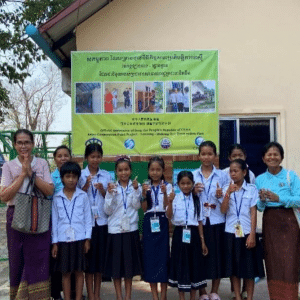On the eve of the opening of the fourth session of the United Nations Environment Assembly, China’s Alashan SEE Foundation teamed up with the Number Five Foundation from the Netherlands and the United Nations Environment Programme (UNEP) to organize the second UN Science-Policy-Business Forum on the Environment in Nairobi, Kenya from March 9 to 11. The three organizations officially launched a global rhino conservation initiative with the theme of “Saving The Rhino Together” to combat the consumption of rhino products. More than 150 people from all over the world attended the conference, among whom were top scientists, business leaders, representatives of social organizations and a delegation of Chinese entrepreneurs.
Rhinos have long been poached because of their precious horns. There are five species of rhinoceros in the world, and all of them are currently in danger of extinction. In order to build a global rhino conservation initiative, it is necessary to promote closer cooperation between the countries of origin and the countries of consumption, and focus more on raising the issue to the political agenda and establishing more effective demand reduction initiatives.
At the conference Laurentien van Oranje, founder of the Number Five Foundation, affirmed the necessity of having Chinese partners like the Alashan SEE Foundation, and expressed the hope that China would wield its influence in the scope of global conservation policy, including promoting policy implementation, reducing and prohibiting the demand for rhino products, and ensuring the implementation of UN resolutions. In the next five years, the Number Five Foundation will work with Alashan and other global partners to establish a new cooperative relationship to protect rhinos. Joyce Msuya, Deputy Executive Director of the United Nations Environment Programme (UNEP) praised this initiative as the creation of a model of collective leadership.
Ai Luming, chairman of the Alashan SEE Foundation, reaffirmed the foundation’s commitment to rhino protection in his keynote speech. Ai also explained that Alashan would formulate a five-year action plan with the Number Five Foundation and promote the global rhino protection act as a top priority of the 15th meeting of the Conference of Parties to the Convention on Biological Diversity in Beijing in 2020. Alashan approves and supports the idea of mobilizing more business leaders to participate in rhino protection and it will continue to drive and integrate Chinese entrepreneurs and social resources to this cause.
Apart from the rhino conservation initiative, the Alashan SEE Foundation also engaged in other agendas during the three-day forum. Ai introduced the efforts that the foundation has made in establishing a green supply chain and fighting climate change. He also pointed out that China’s green financial system has already begun to take shape and the SEE Foundation has accumulatively spent over 80 million yuan, sponsored 53 NGOs in the field of industrial pollution prevention, and facilitated environmental information disclosure and public participation. Through its close cooperation with the China Finance Association Green Finance Professional Committee, the SEE Foundation has launched an experimental enterprise supply chain environmental credit public evaluation system (企业供应链环境信用公共评价体系), which provides financial institutions with enterprise environmental credit files and evaluates the environmental risk performance of the enterprises. It is aimed to advance the green transformation of the enterprise in China.



